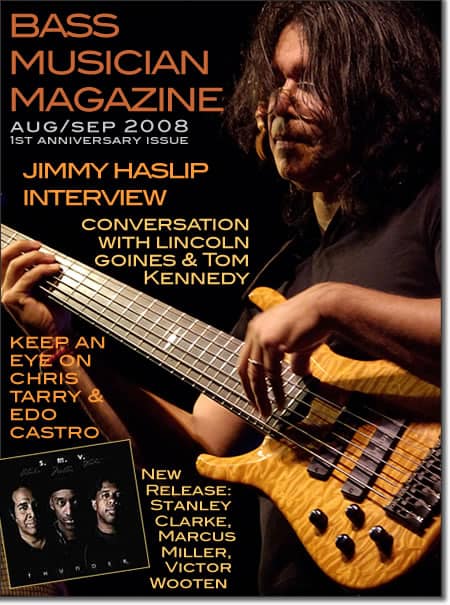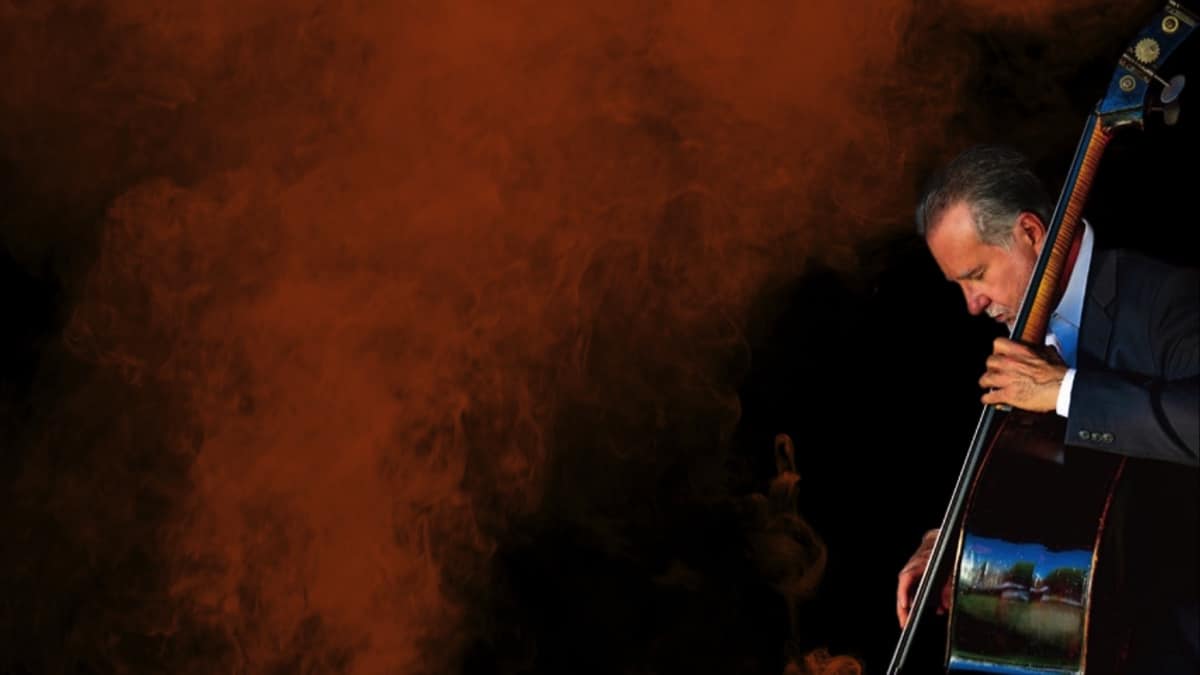Cover
Bass Musician Magazine Featuring Jimmy Haslip / Aug-Sep 2008 Anniversary Issue

Interview with Bassist Jimmy Haslip –
Coming off a 25-year anniversary with Yellowjackets, Jimmy Haslip has proved to be a well-respected and still to this day very integral part of the bass community. His signature melodic lines and uncompromised groove playing has been a part of our musical heritage for decades, and very few players carry that distinction with them.
To move from a stunning ballad from Russell Ferante to a rhythmically and harmonically complex composition by Allen Holdsworth is no easy task, but the man makes it sound like it’s a walk in the park.
His composing skills are an equal match to his virtuosity, and he doesn’t stop there. His production chops keep him incredibly busy with numerous projects and somehow within this almost impossible schedule he still manages to have a regular diet of clinics and workshops… and, he’s working on his 3rd solo project. His obvious dedication to his work and his art are unquestioned, as well as the respect he receives from his fellow artists. These are the credentials needed by any player looking to encompass a long career within the arts, and a close look at this multifaceted musician would be a recommendation on my part to anyone with those same aspirations.
Jake: I know you just had your 25-year anniversary with Yellowjackets, a definite testament to longevity. What do you feel are the key elements involved in keeping the band together for that kind of time span?
Jimmy: it’s a hard one to even think about. I’m actually blown away that we’re still together after all these years. We’re happy to be doing this and never take it for granted. Russell and I will just look at each other and say, I can’t believe we’re still here. It’s like a gift.
One of the things I feel is part of the reason we’re still together this long is we never really put a ball and chain on anybody. We’ve always let everyone do out side projects and participate in other things. I think that helps keep things kind of fresh, and keeps the door open for creative outlets. When you do that, when you give a person that kind of freedom, you will also open the door for keeping things exciting and fresh within the band. People will remain motivated, and the creative energy is there. It’s great to have a project kind of waiting there for you… it’s good to have a home like this to come to, and we’re lucky to have Yellowjackets be a big part of our yearly schedule. That openness to our players is definitely a major element involved in keeping the band together.
Another point is that we’ve all become really close friends. Russell and I have been together for 30 years now, and see each other socially outside of the gigs and the traveling, and the sessions. Our chemistry is so good. Even if we didn’t see each other for a year or so there would still be no major changes. Our friendship, as well as our respect for each other would still be there. It’s a very complex relationship in many ways that ends up working very well.
Jake: I’ve met Russell, and it’s easy for me to understand your feelings about him, as I found him to be a genuinely nice person to be around… brilliant musician, no ego.
Jimmy: That would be him. Again, I have a great respect for him and even in our occasional disagreements like anyone would have; our respect for each other always gets us through that. Like any relationship, communication is very important, and I feel Russell and I have always had great communication between us. We’ve always tried to keep everything on the table. We keep everyone in the band involved, and I think that’s important… it’s a very honest organization. And we’ve had some very honest people doing the business for us over the years as well as far as tours and recording contracts, and our managers, and I think that’s a major factor as well. Also having fourteen Grammy nominations has been extremely motivational to the band. As you can see, the list goes on and on as far as answering your question.
Jake: On more of a personal level, I’m curious. In your opinion, are the dynamics of ‘quote unquote’ airplay ever a consideration, for lack of a better word, with any of the compositions you all bring in?
Jimmy: On certain occasions, that has come up. Over the years when we were with certain record companies, we did get pressure to produce something to fulfill that need. That “is” a subject that we’ve dealt with as far as record companies are concerned… not having to give total details on what we were going to do, but it would come up in conversation, something like, we really need something for the radio. And that’s a very elusive thing.
I’ll be the first one to say that I have no clue what the formula would be for that. I have some ideas of what it could be, and maybe it’s even deeper than that. I don’t know if I could sit down and write a tune that would be 100% bonafide airplay friendly. Obviously we knew that a record company would be supporting us, and giving us money to do records, so on some level we wanted to reciprocate and say, OK, we’ll try to come up with something for you. Now, and I can’t even remember when this actually took place, but now everything has been so compartmentalized. You have the bebop stuff, straight-ahead radio, smooth jazz, and what have you. So you have all these compartments, and we go, where do we fit into this?
Jake: Do you think maybe that’s changing these days? I’ve talked to a lot of people about that. It’s a hard subject because sometimes it feels like nothing is changing, but then again it seems like there are more projects out there now that are not genre restricted per se, and they’re getting noticed.
Jimmy: I’m definitely an advocate for that. I grew up in the sixties and that’s when radio was pretty wide open, and then things seem to drastically change in the industry as far as what was actually being heard out there. I remember seeing the Mahavishnu Orchestra a long time ago in a small club and watching them become almost like a huge rock band so to speak at that time. And I remember thinking, man, if this is what’s happening now, I can’t wait to see what music is going to be like a couple of decades from now. But what became popular as far as airplay goes years later was a far cry from my expectations.
Jake: A dark subject… lets move on. Referring to something I speak a lot about, more or less finding your voice, comes the infamous “what to study”. With all the interviews I’ve done, where to put your time in as far as studying goes has been all over the map. What personally worked for you in this area?
Jimmy: This is another vast area to be addressed, and I get this same question from students in the workshops and clinics that I do. I always try to come up with an answer to that, but there really isn’t one. It’s more about what is going on for you at a certain time in your life, and what you’re interested in. Again, it’s such a vast subject. I’m personally still studying things that I was studying twenty years ago on one level, and on another level I try to look forward and study new things. Improvisation always keeps me studying some more or less technical things.
Mike Stern found an interesting way to look at it. He has a book filled with things that he practices, things that he’s learned as a musician. He calls it ‘the scrolls’. I myself have something kind of like that. It has scales, lines, melodic information, arpeggiated rhythmic figures, etc, etc. I’m constantly adding new things to that list of items that I try to keep with me… perpetual homework. That’s constantly ebbing and flowing. I’ll hear somebody solo that knocks me out, it could be a guitar solo, a sax solo, and a piano solo, not necessarily a bass solo and I’ll feel the need to check it out.
I’ll work on transcribing that first because it’s a chore for me; I’m not real good at transcribing. I’ll work on that first and get as close as I can to getting it right and then I’ll start working on elements of it, have and try to add those elements to my already existing vocabulary. Patterns and scales and lines all come into play. It’s an ongoing process that I guess will go on as long as I have a breath to breathe. I’m always trying to add this material to my improvisational palette.
That’s actually a big thing in the Yellowjackets, being able to exchange ideas all the time. We all get off to our own little personal woodsheds to work on these things, and then we’ll be at a sound check and someone will play something and we all go, what was that? And someone will go, oh, it’s this little voice-leading thing I’ve been working on. Could be Russell saying it’s this voice-leading thing that goes up in major thirds or something to that effect. And then we’ll sit there for an hour and figure out what Russell has already figured out, and will put that into the list of things to work on. For me, it’s also about working on compositional skills. I’m completely self-taught, never took any compositional classes. For that matter, never took any music classes. I did take trumpet lessons in junior high and high school, but never took any bass lessons. Lately, I’m putting a new book together for Alfred music. I wrote columns for Basics Magazine for a long time. I got permission to take all the columns and put them on the desk of the editor over at Alfred’s music. I went through these articles and discovered some things like the Coltrane matrix, which is the series of chord changes in the tune Giant Steps.
Jake: Would that be about the 3 major key centers in that tune?
Jimmy: Pretty much. Alan Pasqua showed me kind of a new way to look at it, which I don’t have quite in my head yet. He was looking at the 3 centers which he called the 3 cells, and it’s a lot simpler to look at it that way, kind of what you just mentioned, and Alan has a formula for that.
Jake: As far as Improv goes, I’ve always found your solos to be more about melody than quantity of notes. Could you articulate how you personally gained command of that approach to soloing beyond your obvious years of experience?
Jimmy. That’s a difficult question, and that’s good. I’m all for that, and it makes me think, gee, how do I do this—what the hell am I thinking about? Again, with my workshops and clinics I’m put in this position all the time. It makes me go back to the shed and do research on where I’m coming from, and that helps me out a lot.
Just off the top of my head, I think a big part of my approach is due to the fact that I started off as a trumpet player. Part of that time I was playing electric bass, but I was a mere beginner, I was just scratching the surface trying to figure out what the hell I was doing. I hadn’t been on the bass to long and was learning tunes by ear, which would be normal for a thirteen year old, unless you’re a prodigy, and that’s not what I was. Somewhere deep down the approach started happening as I was playing the trumpet. I was playing in jazz band and concert band, definitely playing some melodic things, longer notes and the like, basically playing melodic ideas. I think the combination of that, and at that time being into progressive rock kind of got me into that melodic realm. I was listening to a lot of English bass players like Chris Squire, the bass player from Soft Machine, John Wetton who was in King Crimson early on, and Greg Lake from Emerson Lake and Palmer. All these players had a great melodic sense in their approach. When I think about it, the main guy I was listening to was Chris Squire. He played some very interesting things that definitely caught my attention. And then I got into groups like the Allman Brothers.
Jake: Berry Oakley, a very melodic bassist.
Jimmy: That’s right. He played a lot of modal stuff, which was new to me at the time. All these bassists and bands were the backbone of where I started, and got me thinking about playing more with a sense of melody. I remember reading articles by these guys and them talking about playing melodies or counter melodies within the tune. That interested me. Basically, that’s really all it was. And then as time went on I continued to think about things from that approach, as well as adding the multitude of other things that were coming my way. I was also rhythmically touched at a young age by others forms of music—salsa and the like, and I saw these bands live growing up in New York at a very young age. That music left me with a pretty strong impression of what bass was all about. There was a seriously strong rhythmic factor within that music and in some way it also had a melodic ingredient to it as well. In the salsa groove the bass has a very strong rhythmic obligation, and there’s a melodic element as well that kind of fits in like a puzzle. That was a very impressive thing to hear as a young and inspired bassist.
Jake: Another one of your fortes’ is your ability to be the chameleon and blend in with changing rhythms sections. I know it’s hard to articulate on the subject of the defining the groove so let me ask it another way. What do you try to focus on when playing with someone like Vinny, and then moving back to playing with your drummer Marcus who definitely has a different feel?
Jimmy: The one thing I’ll mention about Vinny is that he’s very challenging to play with, and I mean that in a very positive way, he’s so brilliant. I was fortunate to start playing with him in the late seventies so I’ve had a lot of time settling in to how he approaches playing drums.
One of the things that I feel helps me is something that I’m not even sure how I came up with that I got by playing with a lot of different drummers. When I was a kid, I played with a lot of different bands. That’s always been a part of my life, playing music on all levels. Even in high school I was playing with three different rock-and-roll bands. So I learned by playing with all these different bands, and drummers especially, to focus on the kick drum. I figured if I could lock with the kick drum, it would create a solid foundation. Early on that was kind of a challenge because not everybody had good time. So I had to figure out on certain occasions how to lock in with the kick drum and keep the time together.
Keeping good time was one of the elements that I did feel I had a grip on in my earlier playing. I attribute that to when I was listening to the salsa music, and really paying attention and getting the groove. I’ll always remember when I was about fourteen or fifteen years old, I was playing in a band, I think in a church, and this older gentleman came up to me and said “you have a great groove “, and that’s all he said, and I was really proud of that. So a strong sense of time, and listening to the kick drum, and figuring out a way to lock in with a kick drum even if it wasn’t in time and making a groove out of it was important to me.
That became my foundation with all the different players I worked with, even to this day. When I’m doing a gig with Vinny, and following that with a gig with our drummer Marcus Baylor, and then running to do something with Chad Wackerman, I’m always focusing on their kick, and then what they’re playing around that, and lock into that first. That’s the foundation —if I’ve got that everything else will fall into place. Then I’m able to throw in melodic information all round that. But first and foremost is creating the foundation. It’s great to play a lot of fast lines, and melodic ideas, but if the foundation is not there, it can jeopardize the solidity of the entire ensemble.
Jake: I talked to Marcus Miller about a lot of these same ideas, and he stated that his focus, and what he continually tries to improve on is his rhythmic placement within the music, which is directly related to everything you’ve been talking about.
Jimmy: That’s the bottom line, no pun intended. I’m always telling younger students it’s great to have a million chops. If you’ve got that, my hat’s off to you. But our job as a bass player is really about creating the foundation first. Anything beyond that is kind of icing on the cake.
Jake: So what’s coming up for you that we should know about?
Jimmy: I’m vigorously trying to finish my third solo record which is taking forever because of my existing schedule, which are multiple projects that I’m involved with. Also, the guy I’m working with, on this project, Joe Vanalli, is extremely busy as well. He co-produced on my last record Red Heat. We’re actually seeing the light at the end of the tunnel on this as we spent three days working on it before I went out on this tour with the Jackets. I’m hoping to finish that by the end of the year. This album is dedicated to my daughter who went through a life threatening illness and came out on the other side. That was probably one of the most inspiring things I’ve been through in my entire life, my entire 56 years on this planet.
Jake: Couldn’t be happier that it had a good ending my man.
Jimmy: Thanks.
Visit online at www.JimmyHaslip.com
Bass Videos
Brian Bromberg, Paying Tribute to Scott LaFaro – April 2024

Brian Bromberg, Paying Tribute to Scott LaFaro, April 2024…

Brian Bromberg is one heavy-hitting bass player and I am in awe of his talent as one of the few individuals who is equally proficient on electric and upright bass.
You might remember our conversation back in 2018 when he released his powerhouse Funk album. Brian’s “A Little Driving Music” album is a staple on all our road trips and his Jaco and Jimi Hendrix tribute albums are mind-blowing… and I could go on and on.
Now, Brian has taken on the arduous task of producing an album paying tribute to the late, great, Scott LaFaro. He teamed up with pianist Tom Zink and drummer Charles Ruggiero and Brian delivers a commanding performance on upright. The entire album is a masterpiece and a real treat to listen to track after track.
Join us as Brian shares the details behind this project and more.
Photo, Michel Bocandé
Featured Videos
Visit Online
brianbromberg.net
FB @BrianBrombergBassist
YouTube
Cover
Leland Sklar, Over Half a Century of Bass, March 2024

We all have enjoyed Leland Sklar’s Bass lines for over half a century.

You might remember that we had him on our cover back in 2017 and did an update when he launched his book “Everybody Loves Me” in 2020. It was exciting to hear that The Immediate Family had got back together in the studio to work on their own music in 2019 and are now up to two albums.
Just last December, Magnolia Pictures released a documentary titled “Immediate Family” where we got a behind-the-scenes look at the massive contributions Danny Kortchmar, Waddy Wachtel, Ross Kunckle, Leland Sklar and Steve Postell have made in countless songs that are the very essence of our daily personal musical soundtracks. Seeing the astronomical roster of performers they have supported over many years is very eye-opening. It is a must-see for any music lover!
Now, I am thrilled to bring you a special chat with Leland Sklar where we go more in-depth into the bass side of his musical journey.
Photos: Header, Rob Shanahan – Cover Photo, Jay Gilbert/Chris Schmitt
Featured Videos:
Skin In the Game – https://www.youtube.com/watch?v=QhbnzIrdjJ8
from new album Skin In The Game
The Toughest Girl In Town – https://www.youtube.com/watch?v=UVQLZIRfLjU
from new album Skin In The Game
Fair Warning – https://www.youtube.com/watch?v=1DN18DYwLsU –
from the self-titled album The Immediate Family
Visit Online
www.immediatefamilyband.com/
www.facebook.com/TheImmedFamily
www.instagram.com/theimmedfamily/
Bass Videos
Ricky Phillips, STYX Bass And More – February 2024

Ricky Phillips, STYX Bass And More…

I have always been a huge Styx fan. Their music kept me awake during countless nights studying and gave my imagination a place to escape when I had a moment to take a break.
I had the immense opportunity to chat with STYX bassist Ricky Phillips for our August Cover in 2017 and follow his projects as time passed. Now, I am thrilled to have the opportunity to catch up with Ricky as he has been super-busy over the past six years.
Join me as we take a deep dive into the band’s most recent album “Crash the Crown” and EP “The Same Stardust”. Ricky shares some insights into the herculean team effort behind the scenes and the musical process that keeps them ever so busy and how he has updated his sound.
Without further ado… Here is Ricky Phillips!
Photo: Jason Powell
Featured Videos:
“Crash of the Crown” lyric video
“Reveries” lyric video
“Save Us From Ourselves” lyric video
“Sound the Alarm” lyric video
“Too Much Time On My Hands” Zoom video 2020
Visit online:
www.Styxworld.com
FB & IG @styxtheband
Bass Videos
Jeff Pilson, Foreigner Low End – January 2024

Jeff Pilson, Foreigner Low End – January 2024…

Those of us who were around back in the 70’s remember how certain songs on the radio resonated with us. It turns out that many of these iconic melodies came from Foreigner and they were part of our personal soundtracks!
After all these years, the band is going as strong as ever with Jeff Pilson firing away on bass midstream into a 2-year farewell tour.
I am excited to be able to bring you all the details about Jeff’s musical Journey, the farewell tour in progress, how he gets his sound and his plans for the future.
Cover Photo: Krishta Abruzziini / Video Photos: Krishta Abruzzini, Karsten Staiger, Gina Hyams
Featured Videos
For more news on FOREIGNER and upcoming Farewell Tour dates, fans can visit:
foreigneronline.com
facebook.com/Foreigner
twitter.com/ForeignerMusic
instagram.com/foreignerlive
youtube.com/user/FWebTeam
Also on FB @officialjeffpilson
Bass Videos
Rodney O’Quinn, Rockin’ Hard Through the Years – December 2023

Interview With Foghat Bassist Rodney O’Quinn…

Many rock fans have enjoyed music by Foghat, who originally formed in London back in 1971.
Over the many decades of playing, the band members have changed, leaving behind only Roger Earl as the only original member. Bassist Rodney O’Quinn left the Pat Travers Band and joined the group in 2015 and has been laying down the low end for this iconic quartet keeping the Foghat legacy alive. With a new album titled “Sonic Mojo” which dropped on November 10th, the band is as busy as ever and there is lots of very tasty music to come.
Join me as we learn of Rodney O’Quinn’s musical journey, how he gets his sound, and his plans for the future.
Photos:
Cover, Jake Coughlin
Video Thumbnail, Tom Apathy
Photos used in the video: Kerry Quinn, Chuck Lanza, Kim Granger, Kenneth Strohm, Jake Coughlin, Jay Jylika
Featured Videos:
1st Single from Sonic Mojo – Official “Drivin’ On”
2nd Single from Sonic Mojo – “She’s a Little Bit of Everything Official Video
“Road Fever”- California Mid State Fair – Paso Robles, CA – 7-27-22
“Stone Blue” – Rodney O’Quinn Bass/Lead Vocals – Don Odell’s Legends – Woonsocket, R.I – 10/15/22 – The Stadium Theater
The Earl’s Court – Season 2, Episode 7: Funny Guys
“I Just Want to Make Love to You” – CasinoRama – 6-9-23
FOGHAT “Somebody’s Been Sleepin’ in My Bed” – Mohegan Sun, Uncasville, CT – 1/28/22
“I Just Want to Make Love to You” – California Mid State Fair – Paso Robles, CA – 7-27-22
Visit Online:
www.foghat.com
www.facebook.com/Foghat
www.twitter.com/FOGHAT
www.instagram.com/foghat_official
www.youtube.com/user/FOGHATMUSIC



















